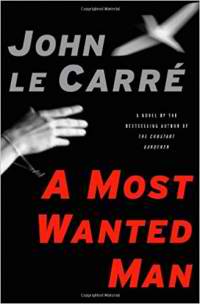A Most Wanted Man by John le Carré
 Saturday, July 27, 2019 at 11:59PM
Saturday, July 27, 2019 at 11:59PM 
Published in the UK and by Scribner in the US in 2008
There is no more observant student of human nature than John le Carré. He explores the spaces between what people say and what they leave unsaid. He examines motivations, which are so often failings: an aging man’s irrational devotion to a young woman; an aging woman’s loyalty to a bond that never existed; bureaucracies at war with each other and bureaucrats at war with their souls. His protagonists are keenly aware of their shortcomings and often think of how their lives could have, or should have, turned out differently. So it is with Tommy Brue.
Brue is a private banker in Hamburg, having inherited and then moved the bank he inherited from his father. Brue also inherited some questionable accounts that his father created to hold wealth smuggled from the collapsing Soviet Union.
A lovely and lively young lawyer for a charitable organization gives Brue an account number that was given to her by Issa, who got it from his father, who got it from Brue’s father. Issa is from Chechnya and has spent time in a Turkish prison. He managed a harrowing journey to Hamburg despite being wanted by law enforcement agencies in several countries.
To determine whether Issa is entitled to funds that Brue would prefer his father had never accepted, Brue must delve into Issa’s identity and history. John le Carré develops not just Issa’s story, but the story of Chechnya — the home of Issa’s mother, who was raped at fifteen by Issa’s Russian father. Issa looks to Brue for protection rather than money, but Brue is not in the protection business. Brue is in the uncomfortable position of addressing moral questions rather than banking questions. If (unlike his father) Brue insists that legal formalities be followed, Issa will likely be deported and then will certainly be tortured, by Turks or Russians or others.
Brue is typical of John le Carré protagonists, particularly in his later work. Brue suspects his wife is cheating on him but doesn’t want to know. He runs from difficulties, preferring avoidance to confrontation. His social behavior is proper but he is incapable of expressing true feelings. He behaves prudently during an uneventful life until the time comes to choose between cautious behavior and meaningful but dangerous action. When he makes the choice, he isn’t entirely sure why. He is energized by a young woman who ignites, if not lust exactly, an opportunity for self-examination.
Issa’s lawyer, Annabel Richter, is also typical of le Carré in that her character is complex and conflicted. She views Issa as “her tutor in unbearable pain and hope.” She has learned from failure — hers as a lawyer, or the legal system’s — that a time would come when she would break all the rules for a client. Issa is that client.
The other key character, apart from Issa, is Gunther Bachman, a German intelligence officer stationed in Hamburg as punishment for his sins. One of his people sees that Sweden has identified Issa as an escaped prisoner from Turkey who gave the slip to Swedish authorities. Bachman works out that Issa may be coming to Hamburg. He then finds himself in a bureaucratic nightmare as British intelligence, the CIA, and his German superiors engage in a turf war.
Issa is far from a terrorist. He wants nothing to do with violence or his father’s wealth, which he regards as ill-gotten and thus in violation of Islamic law. He wants only to pursue a career in medicine. The plot focuses on how the fighters in the war on terror are at war with humanity in their willingness to sacrifice the innocent, all to make doubtful gains in their efforts to thwart terror. Some readers might see the novel as cynical; I viewed it as honest. As always, John le Carré tells a good story and creates characters who stay with the reader long after the last page is turned.
RECOMMENDED
 TChris |
TChris |  Post a Comment |
Post a Comment |  John Le Carré,
John Le Carré,  spy in
spy in  Thriller
Thriller
Reader Comments